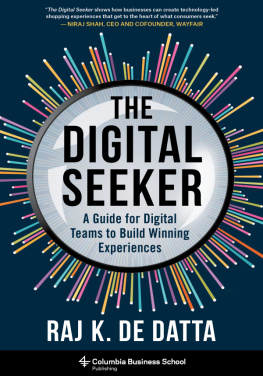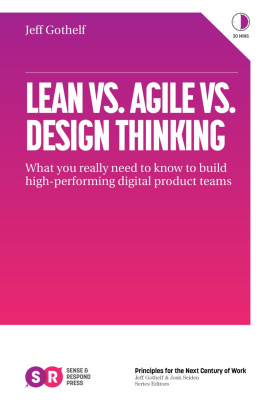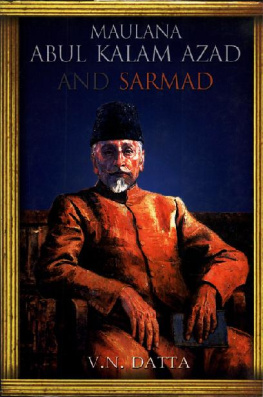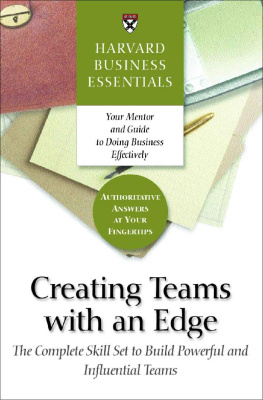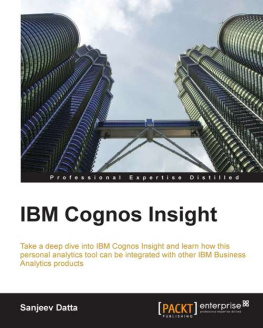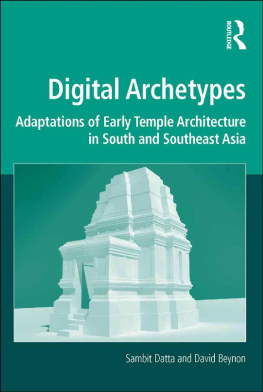Table of Contents
THE DIGITAL SEEKER
THE
DIGITAL SEEKER
A GUIDE FOR DIGITAL TEAMS TO BUILD WINNING EXPERIENCES
RAJ K. DE DATTA
Columbia University Press
Publishers Since 1893
New York Chichester, West Sussex
cup.columbia.edu
Copyright 2021 Bloomreach, Inc.
All rights reserved
EISBN 978-0-231-55444-2
Library of Congress Cataloging-in-Publication Data
Names: De Datta, Raj K., author.
Title: The digital seeker: a guide for digital teams to build winning experiences /
Raj K. De Datta.
Description: New York: Columbia University Press, [2021] | Includes index.
Identifiers: LCCN 2020055281 (print) | LCCN 2020055282 (ebook) |
ISBN 9780231202206 (hardback) | ISBN 9780231554442 (ebook)
Subjects: LCSH: Electronic commerce. | Consumer behavior.
Classification: LCC HF5548.32 .D397 2021 (print) | LCC HF5548.32 (ebook) |
DDC 658.8/72dc23
LC record available at https://lccn.loc.gov/2020055281
LC ebook record available at https://lccn.loc.gov/2020055282
A Columbia University Press E-book.
CUP would be pleased to hear about your reading experience with this e-book at .
Cover design: Noah Arlow
Cover image: Shutterstock
Contents
It wasnt always this complicated.
Twenty years ago you hired a couple of web developers and designers, bought them some pizza, and asked them to stand up a website. Those days were simplethe website was like a digital brochure. Most of the business was in the real world, and the only expectation a customer had was for the website to represent whatever would have otherwise been in a physical brochure. We can call this the Brochure Age of the internet.
Then came Google and Facebook. A whole industry of marketers started running campaigns against those websites, and more and more people started arriving there. Your chief financial officer would then ask questions like How do we make money on our website? That led to a plethora of technologies and marketing tactics designed to build a digital business and to increase the probability that when a consumer or business came to your websites, and later apps, they would buy or sign up or engage or undertake whatever other action you wanted them to. Now we were spending real money. We were hiring armies of people to manually edit and curate those websites. We were spending millions of dollars on digital marketing. We can call this the Digital Marketing Age of the internet.
Pretty soon that digital marketing property became a core part of how we drove leads, customers, revenue, and service. It simply couldnt go down. It was performing a wide range of functionsservice, sales, finance, supply chain, marketing, and so many others.
A parade of technology vendors arrived at your door, each promising a 20 percent revenue bump if you put their bit of tech on your website. Unfortunately, adding ten bits of technology didnt seem to increase revenue by 200 percent, and technology management became more and more challenging. How exactly do you figure out why your website is loading so slowly when you are dependent on ten external vendors and a bunch of external systems? Meanwhile, customers werent just screaming about the problemsthey were switching to native digital properties like Amazon, where billions of dollars of R&D assured a compelling digital experience. Their expectations had risen to where digital had become a utility, one that was expected to always work. In fact, it didnt just need to workit needed to delight them. We started to realize that the separation between the real world and the digital world no longer existed. They had become one and the same. We can call this the Digital Business Age of the internet. No longer are our digital properties just about marketingthey are the framework of the whole business.
In the Digital Business Age, your customers are getting restless. Options have proliferated, but somehow customers have been tasked with doing the work of sorting them all out. Think about the last time you tried doing holiday shopping online. Chances are you started with optimism, hitting the search engines and looking for great gifts. But after a frustrating period of clicking around, you likely defaulted to the Amazon best-sellers list just to get out of there. My company, Bloomreach, powers search and digital experiences for thousands of the largest brands on the planet, including 25 percent of e-commerce in the United States and the UK. Looking at our data set of billions of consumer interactions going back ten years, I can see us searching for content, products, and services. I can see our hopes and dreams playing out in trend lines and keywords. And I can see unfulfilled customers and failing digital experiences in the form of stagnant conversion rates, high bounce rates, and uninspired customer journeys. And then I can see them go to Amazon or some Silicon Valley upstart.
As this plays out, digital teams are wrestling with the challenges they see. Often they are the savants, charged with saving the company from looming disruption. They struggle with conflicting goals, a lack of resources, a talent gap, antiquated technology stacks, nimble competitors, and rising operational and financial targets. Something has got to give.
The practices we learned when the internet was all about marketing are failing us in the Digital Business Age. And our customers are paying the price for it. Classic internet experiences are not giving customers what theyre seeking. Instead, they are turning our customers into screen-hogging automatons, sifting through the noise of the Web trying to find their way. They are turning our businesses into silosthe digital world versus the real world, with one struggling to compete with upstarts and the other continuing to fight yesterdays battles. They are frustrating our digital teams, which often know what to do but struggle profoundly to make the substantial shifts needed to drive progress more quickly.
All this frustration raises a very basic question about why we have the internet in our lives at all: Wasnt this whole internet thing supposed to make our lives simple and easy and straightforward? It doesnt seem to be working out quite that way.
But amid the frustration and the struggles, I see companies winning big across the hundreds of digital businesses we at Bloomreach serve, across my personal investments as an angel investor in tens of start-ups, and across the broader ecosystem of digital contenders. The winners arent just the Silicon Valley success stories we all knowGoogle, Facebook, Apple, and Amazon. I see public-sector organizations like the National Health Service (NHS) in the UK innovating in health care delivery. I see fashion innovators like Stitch Fix and Rent the Runway remaking fashion. I see business-to-business (B2B) distributors like Watsco and MSC Direct reinventing their interactions with field technicians. I see local sports teams like Bayern Munich reimagining their relationships with fans worldwide. I see innovators like HotelTonight rethinking the travel industry by identifying a whole new need for spontaneous travel. And I see organizations like the United States Tennis Association leapfrogging other tennis powerhouses using the power of artificial intelligence (AI) and analytics. Each of these organizations falls into a distinct pattern that drives its winning.






